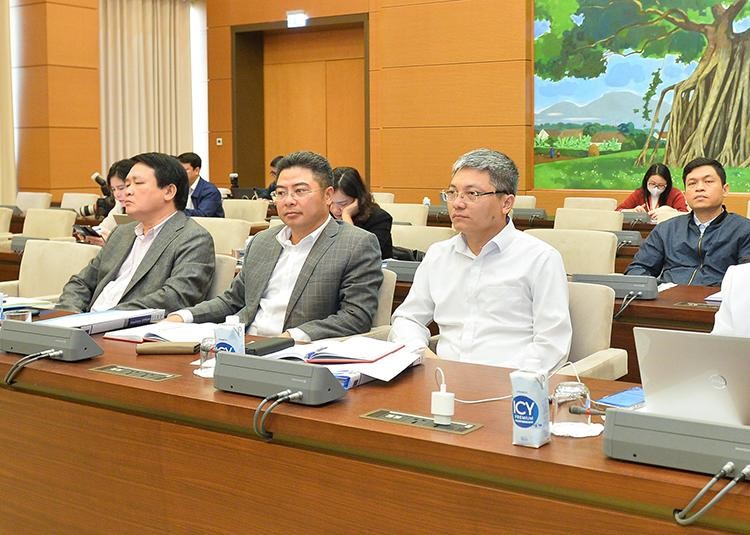On the morning of 13 February 2023, right after the inauguration of 20th meeting session of the Standing Committee of the National Assembly (SC), under the direction of Vice Chairman of the National Assembly Nguyen Khac Dinh, the Standing Committee of the National Assembly discussed and approved the Ordinance on Sanctions of Administrative Violations in the field of State Audit. National Assembly Chairman Vuong Dinh Hue attended and made a speech at the meeting.

National Assembly Chairman Vuong Dinh Hue attended and made a speech at the meeting.
Briefly reporting on the Ordinance on Sanctions of Administrative Violations in the field of State Audit (Ordinance) Project, the State Auditor General Ngo Van Tuan said, after almost 30 years of operation, the legal corridor for organizations and operation of the State Audit Office of Viet Nam (SAV) has become increasingly enhanced and synchronous with the Constitution, the State Audit Law, the State Audit Development Strategy to 2030, the state audit standard to professional processes and regulations. Nevertheless, in fact, violations in the field of state audit tend to on the rise, and there is a lack of specific regulations on sanctions to ensure strict enforcement of laws and regulations as well as handling of violations. This is one of the key factors affecting the effectiveness and efficiency of SAV operations, and the strictness of the Law on State Audit.
Auditor General Ngo Van Tuan reported at the meeting
According to State Auditor General Ngo Van Tuan, public auditing is unique in its specific characteristics and highly specialized activities, reflected in the aspect of covering a wide range of audited entities and having a large scope, including all agencies, units and organizations that are managing and using public finance and assets. According to the Law on State Audit, audited entity is an agency or organization that manages and uses public finance and assets, mainly state management agencies. The determination of which violations are, consequently, acts arising from official duties and tasks assigned to State officials, civil servants, public employees and State agencies will exclude those subjects to sanctioning administrative violations, thereby ensuring the feasibility of the Ordinance in practice.” – highlighted the State Auditor General.
The prominent objective of promulgating the Ordinance is to enhance the legal system on public auditing; create a legal basis for sanctioning violations of the law in the field of state audit and improve the effectiveness of the SAV audit activities and the strictness of the law.
The Ordinance is built on the basis of summarizing and evaluating the provisions of the current law on sanctioning administrative violations in general and in SAV activities in particular, and experiences in sanctioning administrative violations from activities in similar fields. However, this is the first time to develop a legal document regulating administrative violations in the field of state audit, which should only prescribe fines for the known, frequently occuring and commonly happening to ensure the feasibility of the Ordinance.
Up to the present, the draft Ordinance, before being submitted to the Standing Committee of the National Assembly for consideration and approval, has been highly agreed upon by the concerned agencies in terms of structure and content.
Regarding the structure, the Draft Ordinance, after being revised according to the comments of the concerning agencies, consists of 5 chapters: General provisions; Violations, forms and levels of sanction and remedial measures in the field of state audit; Competence to make minutes, competence to pose sanction and apply remedial measures in the field of state audit; Procedures for sanctioning, enforcement of sanctioning decisions and coercive enforcement of sanctioning decisions; enforcement Terms.
Specifically, the subjects sanctioned for administrative violations are those who commit acts of violating the provisions on obligations, responsibilities and prohibitions of the State Audit the Law. To ensure consistency with relevant applicable provisions, the Draft Ordinance stipulates that cadres, civil servants, public employees and state agencies are not subject to administrative penalties for violations while performing their official duties, tasks and such violation acts falls under the assigned tasks and public duties.
Regarding sanctioning forms, based on the provisions of the Law on Handling Administrative Violations, for each act of administrative violation in the field of state audit, violators shall be subject to one of the administrative sanctioning forms, including warning or a fine (up to 50 million VND for individuals and up to 100 million VND for organizations). In particular, the fine level regulations are built in accordance with the principles of ensuring the level of deterrence and strictness of the law, guaranteeing the feasibility, legal educational level and rationality of the applied sanction forms and penalties.
The Draft Ordinance also stipulates remedial measures including: Forcible correction of information, documents and data with false, inaccurate or untruthful contents; forcible return of illegal profits obtained from committing administrative violations in state audit activities; forcible return of an amount of money equivalent to the amount of money, property and other material benefits already given or to be given to lure, bribe members of the audit team.
Regarding administrative violations, forms, levels of penalties and specific remedial measures in the field of state audit, the Draft divided them into 07 groups of violations (which commonly and frequently occur in reality) with corresponding forms, levels of fine and remedial measures.
The draft Ordinance also stipulates the authority to make minutes of administrative violations proceedings; authority to impose penalties and apply remedial measures. Accordingly, the Draft Ordinance stipulates four titles competent to make such minutes: State auditors; Heads of the audit teams; Heads of audit groups; Chief Auditors. This important document specifies the mandates of the audit team leader and the chief auditor in sanctioning and applying remedial measures; in complaints and lawsuits against decisions on sanctioning administrative violations in the field of state audit.
At the meeting, the delegates focused on discussing two contents: Groups of administrative violations in auditing activities; Sanctioning mandate, sanctioning forms, levels and remedial measures.

Members of the Ordinance Drafting Board
Making his speech at the session, National Assembly Chairman Vuong Dinh Hue highly appreciated the preparation work of SAV and the Legal Affairs Committee that took the place of drafting agencies and were in charge of the verification of the Ordinance. The National Assembly Chairman said that SAV has almost 30 years of operation, yet so far there has been no regulation on the administrative sanctions in this field. This fact proves that public auditing is a difficult and complicated field but it does mean that such an Ordinance should be in place to help improve the effectiveness of the audit activities of the State Audit Office and the strictness of the Law.
Giving opinions on specific contents, the National Assembly Chairman requested further clarification on the scope of sanctioning regulation; between sanctioning under the provisions of this Ordinance and sanctioning according to the provisions of the Law on Sanctions of Administrative Offenses, noting the feasibility of the Ordinance, etc.
Regarding the feasibility of the Ordinance, the National Assembly Chairman suggested if the Ordinance regulate the sanctions on issues already regulated by and to be regulated by the Auditor General to have a basis for the sanctions. Along with a thorough review on the contents, the Chairman highlighted the Ordinance should stipulate the extent of violations and violation acts, equal rights and responsibilities of the person performing the audit task, of the units involved in the audit activities, audited units and related organizations and individuals.
The Legal Affairs Committee approved the provision that the effective date of the Ordinance is from April 1, 2023, while also suggesting that SAV urgently carry out preparations for the implementation of the Ordinance, ensuring efficiency and feasibility of this important Document.
On behalf of the Drafting Board, State Auditor General Ngo Van Tuan affirmed that he would fully follow the opinions of the Standing Committee of the National Assembly.
Concluding the discussion, Vice Chairman of the National Assembly Nguyen Khac Dinh said that the Standing Committee of the National Assembly highly appreciated the preparation and coordination of agencies in developing and finalizing the project of the Ordinance.
The Vice Chairman of the National Assembly suggested that the State Audit and the Law Committee fully absorb the opinions of members of the Standing Committee of the National Assembly, especially those of National Assembly Chairman Vuong Dinh Hue, continue to coordinate with the Ministry of Justice and the Research Institute on Legistative Study, Finance - Budget Committee, continue to clarify the opinions requested by members of the Standing Committee of the National Assembly.
At the meeting, 100% of the members of the Standing Committee of the National Assembly voted in favour of the proposal in principle, assigned the Legal Affairs Committee to add to and SAV to complete the dossier, and submit to the Standing Committee of the National Assembly the written form together with a report on opinion absorbing, explanation and completion of the Draft Ordinance. Those are expected to submit to the Chairman of the National Assembly for signing and promulgation in February 2023./.